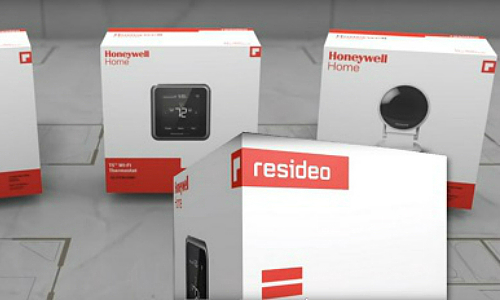Resideo Q2 Revenues Fall as Execs Express Optimism About Market Dynamics
Headwinds caused by the coronavirus were attributed for the revenue losses at Resideo’s ADI Global Distribution and Products & Solutions segments.

AUSTIN, Texas — Resideo Technologies (NYSE: REZI) on Tuesday reported quarterly earnings of 17 cents per share, beating the Zacks Consensus Estimate of 4 cents per share. This compares to earnings of 19 cents per share a year ago. The figures are adjusted for non-recurring items.
Resideo posted revenues of $1.03 billion for the second quarter ended June 30, surpassing the Zacks Consensus Estimate by 1.65%. This compares to year-ago revenues of $1.24 billion. The company has topped consensus revenue estimates two times over the last four quarters.
The company’s Q2 revenue and earnings were down substantially compared to last year, which, during an earnings call with investors, Resideo President and CEO Jay Geldmacher attributed primarily to the coronavirus pandemic.
ADI Global Distribution segment revenue was $631 million, a decrease of 10% compared with revenue of $705 million in the prior year due to branch closures and COVID-related volume decline early in the quarter. Products & Solutions (P&S) segment revenue was $398 million, a decrease of 26% compared with revenue of $537 million in the prior year driven by lower COVID-related demand early in the quarter and COVID-related production delays due to factory labor and supply chain challenges.
Geldmacher, who assumed his role in May, said the company has seen meaningful improvement in both business segments over the past few weeks, with recent industry data and customer feedback pointing to positive trends in demand for both P&S and ADI.
“Sales improved sequentially each month through the second quarter, and July sales were above last year in both P&S [Products & Solutions] and ADI. We remain focused on the pandemic-related risks to our employees and our business. In particular, we are monitoring the reposition of business restrictions in several states and in countries where we have important manufacturing operations, as well as supply chain related risks,” he said.
Geldmacher said the company’s product portfolio is well-positioned to capitalize on these dynamics. “Our previously announced financial and operational review is on track to deliver $30 million to $40 million of savings in 2020 and over $100 million annually in 2021 and beyond,” he added.
Consolidated adjusted EBITDA of $63 million was down 48% in the second quarter compared to the same period last year. ADI segment adjusted EBITDA was down 40% to $28 million as a result of lower revenue. Segment adjusted EBITDA was negatively impacted by reduced supplier rebates and lower early pay discounts.
“Although, we began the second quarter under widespread lockdowns resulting in many branch closures, ADI saw sequential business improvement each month throughout the quarter and daily sales averages rebounded as restrictions lifted and branches reopened,” CFO Tony Trunzo said on the call. “Today, 80% of ADI branches are fully open and virtually all of our branches are open when including those under modified operations and curbside pickup.”
Products & Solutions segment adjusted EBITDA of $35 million was down 53%. P&S adjusted EBITDA was negatively impacted by product mix and increased factory costs related to COVID, partially offset by transformation programs and COVID-19-related cost actions. Business activity and orders reached their lowest point in April and then improved sequentially each month of the quarter, Trunzo said.
Cash from operations for the first six months of 2020 was $71 million, an increase of $108 million year-over-year, primarily a result of lower working capital tied to the slowdown in business activity. Accrued expenses increased as well, partly due to deferral of the $35 million Honeywell reimbursement agreement payment, and $6 million of trademark licensing agreement payments.
Trunzo said the company anticipates an increase in working capital and a decline in accrued liabilities in the third quarter as business conditions improve.
“On July 30, we made our regularly scheduled $35 million reimbursement agreement payment, as well as a $6 million trademark licensing agreement payment to Honeywell. Honeywell has agreed to defer the Q2 reimbursement agreement payment for an additional 90 days through Oct. 30,” Trunzo said. “We remain in discussions with Honeywell, and we’ll update our stakeholders should there be any material developments.”
Trunzo said the company will forgo providing revenue and earnings guidance for the remainder of 2020, given the continued elevated business risk caused by the pandemic.
What Becomes of ADT Parthership?
ADT’s announcement on Monday that Google has acquired a 6.6% stake in the company was a topic of discussion during the earnings call, but Resideo executives were not much willing to elaborate. Resideo has a multiyear agreement to manufacture Command panels and other devices for ADT, and Google’s stake in the company is raising eyebrows on Wall Street on how the alliance will ultimately affect Resideo’s bottom line.
ADT will eventually fully replace its portfolio of hardware — including Pulse, Command and the DIY brand Blue — with an all-Google offering, including Nest cameras, Home Hub and more. ADT expects to offer certain Google devices to its customers beginning this year and to expand the integration in 2021.
“We have a longstanding relationship with ADT and they remain a valued business partner of ours. ADT comprises less than 5% of our consolidated revenue over the last 12 months at approximately our consolidated gross margin,” Geldmacher said. “There has been no change to the terms of our multiyear relationship, and we look forward to continuing our partnership with ADT.”
Analysts queried Resideo executives for more detail about the company’s manufacturing agreement with ADT, such as product types and more specifics about sales, but no additional information was provided.
“Unfortunately, we’re not in a position to get into that level of granularity with respect to ADT. There’s just not a lot of color we can offer there,” Trunza said. “We have a contract with them that obviously is a meaningful one for our business and we’re pleased to be partnered with them. But I can’t get into detail about sort of product mix and how that works.”
If you enjoyed this article and want to receive more valuable industry content like this, click here to sign up for our FREE digital newsletters!

Security Is Our Business, Too
For professionals who recommend, buy and install all types of electronic security equipment, a free subscription to Commercial Integrator + Security Sales & Integration is like having a consultant on call. You’ll find an ideal balance of technology and business coverage, with installation tips and techniques for products and updates on how to add to your bottom line.
A FREE subscription to the top resource for security and integration industry will prove to be invaluable.








